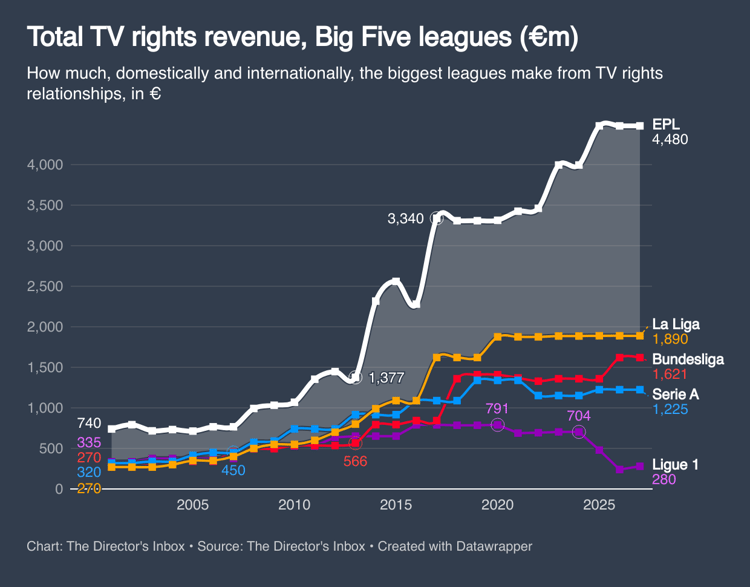-
Analysis
- 9 hours ago
New Premier League financial rules: What are they and how will they affect your club?

The Premier League has voted in a set of new rules that promise to revolutionise Financial Fair Play (FFP) in England’s top-flight.
From the 2026/27 season, Premier League teams will need to abide by a new Squad Cost Ratio (SCR) and Sustainability and Systematic Resilience (SSR) rules, but a proposal for Top-to-Bottom Anchoring (TBA) was rejected.
According to the Daily Mail’s Mike Keegan, clubs voted 12-7 in favour of the new proposals, but why have they been brought in and what do they mean?
- The Premier League has approved new Financial Fair Play rules for 2026/27, introducing a Squad Cost Ratio (SCR) and Sustainability and Systematic Resilience (SSR) system.
- SCR aligns Premier League spending limits with UEFA rules, capping European clubs at 70% of revenue and non-European clubs at 85% to help maintain competitiveness.
- SSR introduces new financial health tests to ensure clubs remain stable in the short, medium and long term.
- Proposed punishments include a six-point deduction for repeated breaches, with further penalties for each £6.5m overspent.
- A stricter spending cap proposal called Top-to-Bottom Anchoring (TBA) was rejected after opposition from major clubs and the PFA.

Why Premier League clubs wanted new FFP rules
Premier League CEO Richard Masters has told Sky Sports that some clubs are concerned that they are having to balance FFP on two different playing fields. While the Premier League has its own set of rules, UEFA has a different set for European competition.
The aim is to find a better alignment between the two.
He explains: “We've done probably a year's work with internal working groups and talking to clubs about developing a new system. The principal starting point for that was alignment with UEFA, so our current PSR rules were aligned broadly to the FFP rules of UEFA when they were brought in.
“We came second and brought them in and they were the same. So, clubs that are operating in dual systems coming in and out of Europe don't have to operate on entirely different systems. So, there's continuity of financial planning and that was the principal driving force between looking at what we call squad cost ratio, which is what is implemented in Europe.”
What the Premier League’s Squad Cost Ratio means for clubs
Squad cost ratio (SCR) has been imposed by UEFA since 2023 and limits how much clubs can spend as a percentage of their earnings.
Under UEFA’s legislation, clubs can spend 70% of their revenue on their squads, which includes transfers and wages.
The Premier League has now agreed that its clubs in Europe follow this rule, but clubs that do not have continental football can spend up to 85% of their revenue on their squads. On top of this, there is a multi-year allowance of 30% that they can use to spend in excess of this figure. This will incur a levy and, once exhausted, will result in a sporting sanction if the 85% mark is not met.
Why do non-European clubs have the opportunity to spend more money? Simply because they are missing out on the lucrative income that playing in the likes of the Champions League can bring and, therefore, it is seen as a way to balance out competitiveness.
The Premier League states: “The new SCR rules are intended to promote opportunity for all clubs to aspire to greater success and brings the League’s financial system close to UEFA’s existing SCR rules which operate at a threshold of 70 per cent.
“The other key features of the League’s new system include transparent in-season monitoring and sanctions, protection against sporting underperformance, an ability to spend ahead of revenues, strengthened ability to invest off the pitch, and a reduction in complexity by focusing on football costs.”
One advantage of this system is that clubs are not studied by looking at past results. Instead, they are given a clear budget that they should stick to each season. This is revised each year.

What is Sustainability and Systematic Resilience?
The new Sustainability and Systematic Resilience rules are designed to ensure that the long-term finances of a club are in good order. They are in place to ensure clubs are not put in jeopardy by any spending splurges.
The Premier League states (via Ben Jacobs): “The Sustainability and Systemic Resilience rules assess a club’s short, medium and long-term financial health through three tests – Working Capital Test, Liquidity Test and Positive Equity Test.”
Premier League’s proposed punishments for FFP rule breaches
Clubs who breach the rules on multiple occasions will be handed a six-point penalty, according to BBC Sport, which adds that for every £6.5m of overspend, another point will be taken off.
It should be noted that this has not been confirmed.
Why was Top-to-Bottom Anchoring (TBA) rejected?
TBA was undoubtedly the most controversial proposal put to a vote, and it is not a big surprise that it was rejected, given the high-profile opposition to it.
It was proposed that this would run in parallel to SCR, offering a further cap to spending based on the central income of the league’s lowest-earning side.
Central income is derived apart from other revenue. It entails prize money and television rights, which is divvied up on an annual basis by the Premier League.
It had been proposed this would be set around 5x the income of the league’s bottom club in this regard and would have acted as a definitive spending cap.
However, it drew opposition from certain owners, like Manchester United’s Sir Jim Ratcliffe, as well as the PFA.
Ratcliffe said: “TBA inhibit the top clubs in the Premier League, and the last thing you want is for the top clubs in the Premier League not to be able to compete with Real Madrid, Barcelona, Bayern Munich, PSG - that's absurd.”

The PFA has expressed concerns over the TBA model, suggesting that it will restrict the wages of players.
PFA chief executive Maheta Molango said: “We have a tendency in football to think that we're above the law, but football is not above the law, and unfortunately the reality is you cannot artificially cap someone's ability to make a living.
“There are ways to agree on things around financial sustainability, but this cannot be imposed unilaterally.”
The Premier League responded via a statement: “We disagree with the PFA's views regarding the proposed financial rules and the extensive consultation process we have been conducting.
“The PFA has had numerous opportunities since March 2024 to provide feedback on, and shape, the proposals...Where the League has received feedback...including the PFA, we have considered it carefully and, where appropriate, incorporated it into formulating the draft rules.
“It is our objective to maintain the Premier League's value, competitive balance and ensure clubs operate in a financially sustainable way.”



















